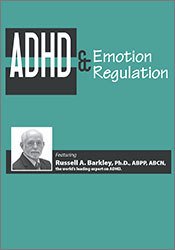
ADHD & Emotion Regulation with Dr. Russell Barkley
Credit Available - See CEUs tab below.
- Categories:
- ADHD | Self-Regulation
- Faculty:
- Russell Barkley, PhD
- Duration:
- 1 Hour 17 Minutes
- Format:
- Audio and Video
- Original Program Date:
- 13 May, 2014
- SKU:
- POS047335
- Media Type:
- Online Learning
Description
Returning emotion to its rightful place as a core feature of ADHD serves to better explain the development of comorbid disorders, such as oppositional defiant disorder, as well as various life course impairments. Dr. Barkley will show you how to determine which aspects of emotional adjustment problems in ADHD cases are the result of the disorder, and which are likely to be the consequence of comorbidity or other life course circumstances. He will also address the implications of including emotion in ADHD for its management.
CEUs
This course is available for 1.5 total CPDs.
The HPCSA has declared that any on-line courses CPD/CEU credited by a certified US board, is automatically CPD/CEU credited in South Africa.
As there are different boards for different disciplines, we at Acacia suggest that you use the Counselling CPD/CEU credits. These correspond to South African credits of one CPD/CEU per 60 minutes. If you choose to use your discipline's credits, please do so at your discretion.
PESI, Inc. is an approved provider with the Florida Board of Clinical Social Work, Marriage and Family Therapy and Mental Health Counseling. Provider Number 50-399. This self-study course qualifies for 1.5 continuing education credits.
Handouts
| File type | File name | Number of pages | |
|---|---|---|---|
| Manual (1.1 MB) | 20 Pages | Available after Purchase |
Faculty

Russell Barkley, PhD Related seminars and products
Russell A. Barkley, PhD, recently retired (January 1, 2022) from his position as a Clinical Professor of Psychiatry at Virginia Commonwealth University School of Medicine (2016-present). He is also a retired Professor of Psychiatry and Neurology from the University of Massachusetts Medical Center (1985-2002) and subsequently worked as a Professor of Psychiatry and Health Sciences at the Medical University of South Carolina (2003-2016). Dr. Barkley is the founder and Editor of the clinical newsletter, The ADHD Report, which he continues to edit in this 30th and final year of publication (2022). He is board certified in Clinical Psychology (ABPP), Clinical Child and Adolescent Psychology, and Clinical Neuropsychology (ABCN, ABPP).
Dr. Barkley is a clinical scientist, educator and practitioner who has published 27 books, rating scales, and clinical manuals numbering more than 43 editions, and creator of 7 award winning professional videos. He has published more than 300 scientific articles and book chapters related to the nature, assessment, and treatment of ADHD and related disorders and is the author of the book Managing ADHD in School (PESI, 2016).
Dr. Barkley has presented more than 800 invited lectures in more than 30 countries and appeared on nationally televised shows such as 60 Minutes, the Today show, Good Morning America, CBS Sunday Morning, CNN, and many others. He has received numerous awards from professional societies and ADHD organizations for his lifetime achievements, contributions to research and clinical practice, and the dissemination of science.
Speaker Disclosures:
Financial: Dr. Russell Barkley receives royalties as a published author and is a consulting reviewer for the Journal of Attention Disorders. He previously received a speaking honorarium from Astra Zeneca and Takeda Pharmaceutical Company. Dr. Barkley receives royalties from ContinuingEdCourses.net, Seminarer.DK, and the American Psychological Association. He receives a speaking honorarium, recording, and book royalties from PESI, Inc. He has no relevant financial relationships with ineligible organizations.
Non-financial: Dr. Russell Barkley is a member of the American Psychological Association, the South Carolina Psychological Association, and the American Professional Society for ADHD and Related Disorders. He serves as an examiner with the American Board of Clinical Neuropsychology, Inc. and the American Board of Professional Psychology, Inc.
Target Audience
Psychologists, Counselors, Social Workers, Case Managers, Addiction Counselors, Marriage & Family Therapists, Nurses, Teachers/Educators, Speech-Language Pathologists, Occupational Therapists & Occupational Therapy Assistants, and other Helping Professionals that work with children.Objectives
- Identify current neuropsychological theories of ADHD and the key role of emotional self-regulation problems in understanding the nature of ADHD
- Discuss the neuro-anatomy of ADHD and why those brain regions implicated in the disorder would be associated with poor emotional self-regulation
- Identify why certain comorbid disorders such as ODD are better explained by the role of emotion in ADHD than by the current DSM view of ADHD
- Explain how dysregulated emotional control in ADHD predicts the development of various life course impairments
- Describe the role of poor emotion regulation in the assessment and management of ADHD
Outline
- Current Clinical View of ADHD (excludes emotion)
- Defining Emotion and Emotional Self-Regulation
- Overview of 7 Arguments for Including Emotional Dysregulation in ADHD
- History of ADHD Includes Emotion until 1968
- Neuroanatomy of ADHD Includes Emotion Regulation Structures
- Neuropsychology of ADHD Includes Emotion Regulation Networks
- Psychological Evidence Shows Impulsive Emotion and Poor Self-Regulation in ADHD
- Emotional Dysregulation Predicts Life Risks Not Predicted by ADHD Traditional Symptoms
- Including Emotion Permits Deeper Understanding of Comorbidity in ADHD
- Implications of Emotional Dysregulation for Diagnosis of ADHD
- Implications of Emotional Dysregulation for Management of ADHD
Please wait ...
